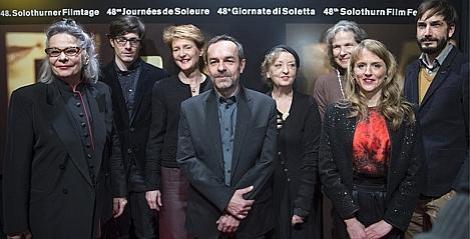
What: Film Review
Directed by: Marcel Gisler
Written by: Marcel Gisler, Rudolf Nadler
Produced by: Susann Rudlinger
Starring: Sibylle Brunner, Judith Hofmann, Fabian Kruger, Sebastian Ledesma
Language: German (Swiss dialects) w/ English subtitles
Running Time (in min.): 106 minutes
Rating: Not Rated
Official Selection of the 56th San Francisco International Film Festival
Rosie (2013)
A family’s internal struggle is brought to an intriguing climax in the new film from Swiss LGBT filmmaker Marcel Gisler. Already the winner of several major awards in Switzerland, Gisler’s feature Rosie is a comic character study that strikes, perhaps too closely, to the heart of Tamara Jenkins’s The Savages (2007). Intentional or otherwise, Gisler’s movie is can’t help feeling like a rehash of infinite clichés and iterations of the same domestic issues in films from around the world, despite the wit and charm that underscore the proceedings.
Rosie, a lonely senior citizen living with a rambunctious cat and a severe addiction to alcohol, collapses alone one night and is spared death when the local mailman discovers her. So bad is Rosie’s health that her grown children, fifty-year-old author Lorenz (Fabian Kruger) and dissatisfied housewife Sophie (Judith Hofmann), are forced to begin caring for her in shifts. As in Jenkins’s feature, both children – one a blocked-up “genius” writer, the other a marriage-hating domestic – suffer from memories of their mother’s verbal abuse and overall poor behavior. Gisler, working from a script he co-wrote with Rudolf Nadler, never allows the actors to let up on the pain that Rosie once caused their characters; though she is in process to becoming an invalid, Lorenz and Sophie consider her more a burden than anything.
But Rosie, played to excellent effect by the acclaimed character actress Sibylle Brunner, refuses to be committed to a permanent nurse, a rehabilitation clinic, or impending death. Gisler and Nadler utilize a chapter structure here, each new section of the film occurring with Lorenz’s ever-expanding list of visits from fabulous big-city Berlin to his mother’s comfy Swiss town of St. Gallen. Just as Lorenz uses these trips as an excuse to delay the new novel he can’t seem to get off the ground, Sophie tries to distract herself from her failing marriage. It should come as no surprise that both children are scarred by the pathetic relationship Rosie shared with her former husband; Lorenz remains terrified of commitment to one man into middle-aged bachelorhood, and Sophie cannot stop herself from kissing and making up with her distant husband. That they both blame their mother, who can’t keep from rattling off her mouth with epithets and insults, lends these visits their tension.

As the stoic but secretly sensitive Lorenz, Kruger anchors the film with a natural, sweet man-childishness. When Kruger indulges in a small smile or a moments of cathartic discussion with Brunner, Rosie reveals a gooier heart than its eponymous mama would like. Appropriately, Brunner herself is rarely allowed moments away from her one-note saucy grandma shtick, however good she is at it. As Gisler and Nadler move closer to the film’s strongest chapter – a climactic circle of discussions about Lorenz’s sexuality and Sophie’s final choice in her marriage – Rosie remains adamantly dark and cynical. Her mood brings down a film whose biggest triumps are in its whispy cleverness and soft heart.
In those triumphs, Gisler and Nadler do find great moments, some of which speak to the film’s powerful comments on gay lifestyles and the trouble with being a writer (though these issues found much more entertaining breadth last year in Martin McDonagh’s astounding Seven Psychopaths [2011].) Lorenz’s relationship with sexy young disc jockey Mario (Sebastian Ledesma) feels so lived in and loving that, in their scenes together, we forget just how poorly Rosie parented her children. Similarly, in domestic squabbles with her hubby and son, Hofmann’s Sophie buckles under the emotional pressure so convincingly that her expressions and arm movements herald the best-acted scenes in the piece.
Though Rosie is troubled by these inconsistencies in town and writing, it has also found acclaim on the international circuit, and managed to secure an Official Selection spot in the 56th San Francisco International Film Festival. It might help potential viewers not to have seen Jenkins’s film, or any other work with such a similar template, in order to appreciate what the Swiss considered one of the year’s best national films.

